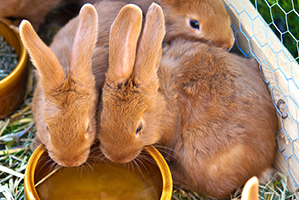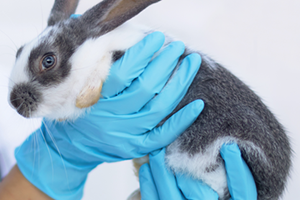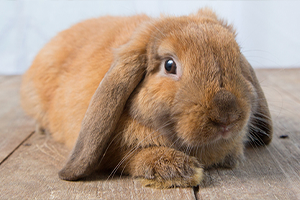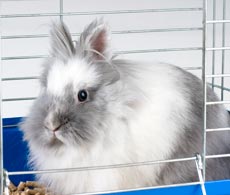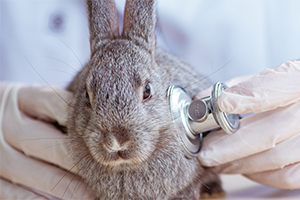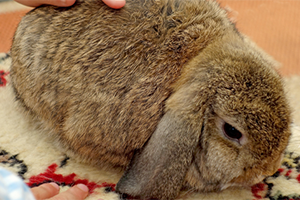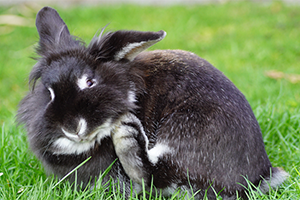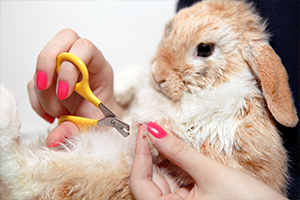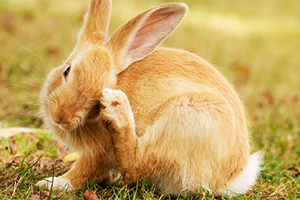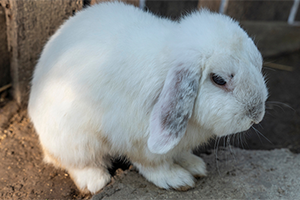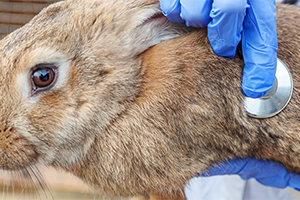What to feed rabbits

Quick Links
Food for thought
Consider a day in the life of a wild rabbit. They spend 70% of their time searching out or foraging for food, eating grasses, hay, herbs and bark – which are all high in fibre. Their territory is the size of around 30 tennis courts, meaning they cover a lot of ground and get plenty of exercise each day, searching for food around the area.
The rabbit’s whole existence has evolved around this high-fibre diet. So, just as in the wild, pet rabbits also need high levels of fibre in their diet to keep them fit and healthy. But what should a bunny eat?

Digestive health
Constant nibbling on hay and grass helps keep your rabbits’ digestive system moving. Good-quality hay and grass should always be freely available and form the biggest part of their diet. Rabbits like to graze naturally, eating grass and other plants, particularly at dawn and dusk – but don’t feed them lawnmower cuttings, as this can make them ill.
Without this indigestible fibre, there is a risk of constipation, a potentially fatal condition in rabbits. When thinking about your rabbits’ diet, it’s important to remember that fibre also helps maintain the right balance of ‘friendly’ bacteria in their digestive system. A lack of digestible fibre will upset the cycle and can lead to bloating and even anorexia.

Dental health

Emotional health
Foraging for grass, herbs and hay is what keeps rabbits busy in the wild. So, it’s important to ensure domestic bunnies don’t get bored sitting in a hutch for most of the day. Keep your rabbits occupied by hiding hay, healthy herbs and the occasional greens around their hutch. Of course, it’s essential to give them lots of exercise outside the hutch, too.
Remember to adjust feeding quantities to make sure your rabbits don’t become underweight or overweight.
What can rabbits eat?
Alongside fresh, clean drinking water that is checked twice daily, free from algae in summer and not frozen in winter, rabbits also need:
- Good-quality fresh hay
- Growing grass
- Greens, such as dandelions, parsley and mint
- A small amount of good-quality pellets or nuggets
What veg can rabbits eat?
Your rabbits will enjoy eating washed leafy green vegetables such as
- Lettuce
- Spinach
- Kale
- Watercress
- Broccoli
- Celery
- Cabbage
- Squash
- Carrot tops
What fruits can rabbits eat?
Though only to be given occasionally as a treat, bunnies enjoy:
- Apples (with the seeds removed)
- Bananas
- Blackberries
- Blueberries
- Grapes
- Strawberries
The right rabbit diet
It’s important to find rabbit food that will give your pets the right levels of fibre, vitamins and minerals needed for a healthy, balanced diet. The Excel Feeding Plan from Burgess Pet Care is the UK’s number one vet-recommended range of food for rabbits and is based on all the natural foods your rabbits would eat in the wild.
Avoid muesli-type food which can be high in starch and sugar, as rabbits – just like children – have a tendency to leave behind the elements that are healthy in favour of the sweet bits.
Speak to your vet if you’re unsure about what to feed your rabbit, as they can advise you on the most appropriate diet. If you have Petplan rabbit insurance, you can also access free 24/7 advice directly from veterinary experts. Head to the Pet expert chat feature within your MyPetplan account for recommendations.
Petplan is a trading name of Pet Plan Limited (Registered in England No. 1282939) and Allianz Insurance plc (Registered in England No. 84638), Registered office: 57 Ladymead, Guildford, Surrey GU1 1DB.
Pet Plan Limited is authorised and regulated by the Financial Conduct Authority. Financial Services Register No. 311969. Allianz Insurance plc is authorised by the Prudential Regulation Authority and regulated by the Financial Conduct Authority and the Prudential Regulation Authority. Financial Services Register No. 121849. Pet Plan Limited is a subsidiary of Allianz Insurance plc.

